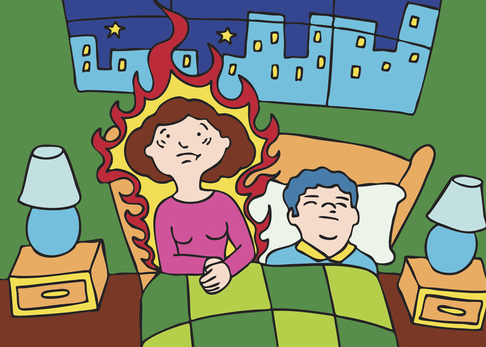By Alicia Wanek
A Pinterest board recently had a very funny meme that read, “When I asked for a smoking hot body, menopause was not what I had in mind.” The fact is menopause is unavoidable, but obstetrician/gynecologist Dr. Katrina Walsh, says, “This is the time of life to be enjoying yourself.” She does admit, however, that “the change” has its fair share of challenges.
Dr. Walsh says the average age of onset of menopause is 52 to 55, although perimenopausal symptoms can begin up to a decade before. This is the period of time when women begin to have hormonal fluctuations but still have a monthly cycle. The factors which most influence when it will start for you are a) your diet, b) how much exercise you get, and c) when your own mother went through it.
“These days, 50 is the new 40. Women are healthier and living longer, so there’s a lot of life to live after menopause is over.”
Eventually, all women will go through that season of life, and many of the symptoms are not “fun.” “I see a lot of women with decreased libido, vaginal dryness, weight gain, hot flashes and irritability when they feel like they’re often ‘short’ with people,” says Dr. Walsh. The big question is, what can we do to make it as smooth as possible?
“It all comes down to how we handle it,” Dr. Walsh believes. Part of that is attitude, but medically there are a lot of options available. Hormone replacement therapy (HRT) is the most popular route.
Our bodies need estrogen and progesterone, Dr. Walsh explains, and HRT has come a long way in helping to keep that balance. The good news is that HRT protects bone density and promotes collagen/elasticity of the vagina, bladder and rectum. The bad news is that there is a 0.08 percent increase in breast cancer and possibly an increased risk of ovarian cancer. Prolonged use can increase a woman’s risk of heart attack or stroke. Creams or patches have less significant effects than oral HRT treatment but may be less effective. A new hormone treatment NOT approved by the FDA is the testosterone pellet, Dr. Walsh shares. This definitely helps with libido but can have many side effects including acne and hair loss and increased risk of blood clots, among others.
The hormonal changes can cause physical changes as well. Metabolism slows by 30-33% at menopause, so many women are surprised at their weight gain when their diet hasn’t changed. Another symptom women experience is one we talk about less. Recently, there have been new laser treatments available to women to help with elasticity “down there.” There are also several creams and suppositories, prescription and over-the-counter, which can help with dryness that can cause pain with intercourse. Calcium and magnesium supplements can help with mood as well as with constipation or bloating. Talk to your doctor and tell them about everything you’re experiencing. We want to feel sexy, no matter how old we are, and there may be something to help.
“Menopause is a great time for women,” Dr. Walsh reminds us, “because they don’t have to worry about periods and pregnancy.” These days, 50 is the new 40. Women are healthier and living longer, so there’s a lot of life to live after menopause is over. “I don’t want women to be defined by age. I want them to be defined by their abilities, and I think we keep getting better and better,” she says. Amen to that!


